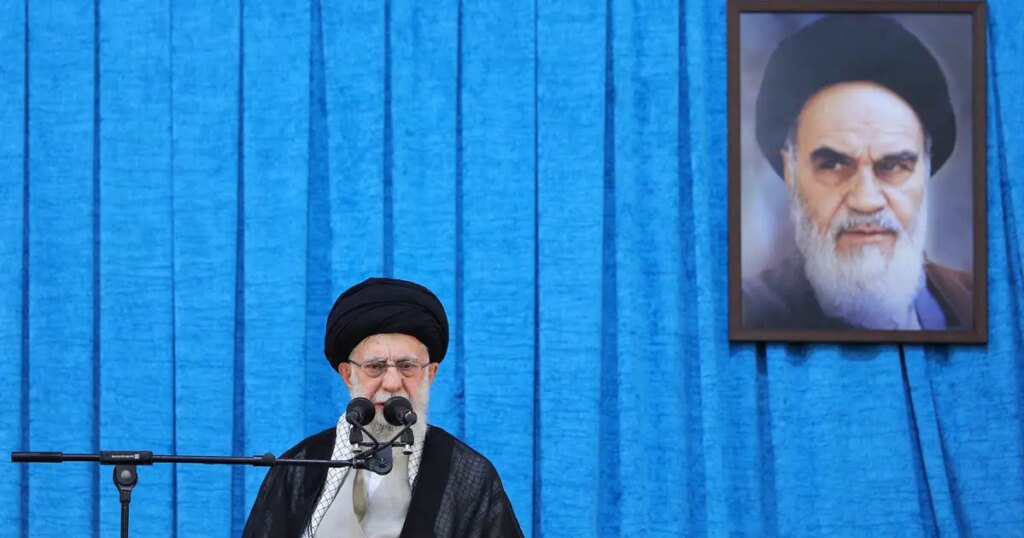There is a general view among international Iran experts that the death of President Ebrahim Raisi is unlikely to affect Tehran's political and economic policies, which are ultimately dictated by Supreme Leader Ali Khamenei.
Previous administrations, including those of Presidents Hassan Rouhani and Mohammed Khatami, have achieved some progress in foreign policy, suggesting there is a small chance of change in this area.
During President Rouhani's tenure, Supreme Leader Ayatollah Khamenei demonstrated flexibility by agreeing to the JCPOA. Similarly, during President Khatami's time (1997-2005), a policy of detente led to a reduction in the regime's terrorist activities in Europe, which Ayatollah Khamenei did not object to.
While it is widely known that Iranian elections are rigged, some have speculated that the next presidential administration could create an opportunity for a shift in foreign policy and potentially reinvigorate stalled nuclear negotiations.
Several candidates registered for the election have addressed the issue, offering somewhat different foreign policy positions from those of President Raisi and Foreign Minister Hossein Amir Abdullahian, a hardline figure who also died in a helicopter crash on May 19.
Parliament Speaker Ali Larijani, a close aide to the former Rouhani administration who ratified the JCPOA in just 20 minutes, has voiced the need for a change in Iranian foreign policy direction. If he can get through the Oversight Council's “filtering process,” he could speed up the negotiations and ease tensions between the Biden administration and Tehran.
“To overcome obstacles, we must abandon outdated ways of doing things,” Larijani said when he registered to run for the presidential election. Kayhan, Tehran's most hardline newspaper, interpreted this as a criticism of the Raisi government's foreign policy. Kayhan responded by criticizing the JCPOA and the influence of the U.S. and Britain, calling the agreement and the process of following it “the height of humiliation, the height of nadir.” While Larijani was advocating a new approach to foreign policy, Kayhan defended the current government's hardline stance and dismissed any return to the JCPOA as humiliating.
Another candidate in the upcoming elections, Saeed Jalili, has been at odds with Ali Larijani over nuclear negotiations. According to an unofficial report of the 2022 special session of the Expediency Council, which has not been denied, Jalili proposed withdrawing Iran from the NPT, a proposal opposed by Ali Larijani, Sadegh Larijani and Ali Shamkhani.
Recently, unofficial reports, which have not been refuted, have said that the nuclear negotiations have been handed over to Ali Shamkhani, suggesting that Saeed Jalili is not the right candidate to drive Iran's current foreign policy.
If Ali Khamenei seeks to continue negotiations with the 5+1, albeit not in the same manner as Saeed Jalili, who served as chairman of the National Security Council, this could increase the likelihood that Ali Larijani's credentials will be approved by the Oversight Council. This development could also affect the council's credibility given that it previously rejected Larijani's candidacy in 2021. Such a scenario highlights the complex interplay between foreign policy and domestic politics.
Former President Mahmoud Ahmadinejad has also announced that he will run again. However, because he has been disqualified in the past, the Guardian Council is likely to disqualify him again, reducing his influence even if he changes his previous position. Historically, Ahmadinejad has opposed negotiating a nuclear agreement with the United States, and he was excluded from talks held by Atomic Energy Organization of Iran head Ali Akbar Salehi with US officials in Oman in 2012.
Mohammed Bagher Ghalibaf, who registered as a presidential candidate shortly after assuming his new position as speaker of parliament, has repeatedly made inconsistent and unclear statements about the nuclear negotiations and the Joint Comprehensive Plan of Action (JCPOA), making it unlikely that his administration would bring about any major changes to Iran's nuclear policy.
For example, after the Majles gave its full approval to the “Strategic Actions for the Lifting of Sanctions and Protection of the Interests of the Iranian People” bill, he said, “Parliament has sent a message to the enemies of Islamic Iran that the one-sided game is over.” However, he later reversed his stance after the ratification of the JCPOA, saying, “Every fair person considers the success of the diplomatic system a basis of national pride.”
When he registered as a presidential candidate, Eshaq Jahangiri promised to lift sanctions against Iran, but achieving that goal will require accelerating nuclear negotiations.
Jahangiri's preferred policy approach was similar to that adopted by former Foreign Minister Javad Zarif and President Rouhani in the first and second years of the Biden administration, which aimed at diplomatic efforts to ease sanctions. However, despite their efforts, this approach faced strong opposition from Supreme Leader Ali Khamenei and ultimately failed to lift sanctions or achieve any significant results.
Regarding Iran’s late President Ibrahim Raisi, the supreme leader’s decision in 2021 was straightforward: Mr. Raisi was a staunch supporter whose loyalty was unquestioned, and that confidence ultimately led to the disqualification of several other presidential candidates and ensured Mr. Raisi’s election.
In the current political climate, Khamenei faces a more complicated situation in selecting the right person to be the next president: he can no longer simply support one loyal candidate without risking major backlash and future problems.

